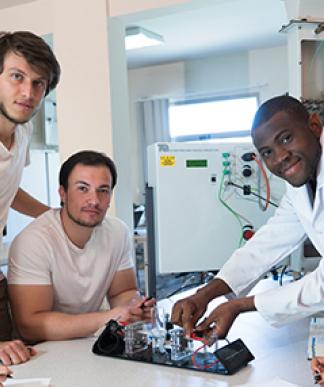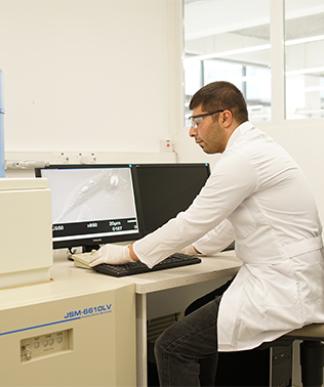


About the Program
Energy Systems Engineering is an engineering branch that conducts studies on energy production systems, resources, systems modelling, simulation, optimization, analysis, design, energy storage, and energy efficiency. The legislation, management, and policies inherent in the modern energy sector are important for energy systems engineering. Besides the use and management of available technologies, energy systems engineers should also be able to produce new technologies. Therefore, the Energy Systems Engineering Program aims to train qualified engineers who are able to use energy resources in an efficient way, can plan energy production, usage, and transmission, understand energy-related laws, and are capable of critical thinking while following ethical and social principles in their professional practices.
Education Opportunities
The curriculum of the Energy Systems Engineering Program covers basic sciences in the first year and, in the second year, it offers technical courses involving tools such as thermodynamics, heat and mass transfer, and reaction kinetics. From the second year onwards, courses focus on various energy systems, and students use fully-equipped engineering laboratories for practical components of learning. Most of the courses offered in the third and fourth years are in the practical labs allow fostering students’ theoretical and practical education. The practical component of the curriculum are fulfilled by attending training courses where students see the studies conducted in the field of energy at other institutions. At the end of four years, each student receives a graduation project, the main purpose of which is to help students conduct studies in topics learnt during their education and find solutions to recent problems.

Career Areas
Energy systems engineers can develop careers in a broad range of workplaces in the public and private sectors. The increasing amount of energy investments, especially over the last decade, has resulted in an increase in demand for engineers in the energy sector. Graduates of the Energy Systems Engineering Program can work in areas related with energy efficiency, energy conservation, and energy laws. Today, in response to the demand for clean energy, investments are increasing in renewable energy, such as solar, wind, bioenergy, geothermal, and hydroelectric power plants. In addition to these, there are planned developments in thermal power plants and nuclear power plants. These developments also create a significant source of employment.
Contact
Faculty of Engineering
Science and Technology Center, ST 226
Tel: +90 392 671 1111 Extension: 2401
Faculty E-mail: secretary-fe@ciu.edu.tr
Head of Department: Prof. Dr. Mustafa DAĞBAŞI
Head of Department E-mail: mdagbasi@ciu.edu.tr
Compulsory Courses
First Semester
GENERAL CHEMISTRY
Course code
CHEM110Credit
4Theoretical
3Practical
2Ects
6INTRODUCTION TO COMPUTING
Course code
CMPE101Credit
3Theoretical
2Practical
2Ects
5READING AND WRITING SKILLS-I
Course code
ENGL141Credit
3Theoretical
2Practical
2Ects
4INTRODUCTION TO ENERGY SYSTEMS ENGINEERING
Course code
ENRE100Credit
0Theoretical
1Practical
0Ects
2HISTORY OF CIVILIZATION
Course code
HIST100Credit
0Theoretical
2Practical
0Ects
2CALCULUS-I
Course code
MATH101Credit
4Theoretical
3Practical
2Ects
5LINEAR ALGEBRA
Course code
MATH121Credit
2Theoretical
2Practical
0Ects
3MODERN TURKISH HISTORY
Course code
TARH100Credit
0Theoretical
2Practical
0Ects
2Second Semester
INTRODUCTION TO PROGRAMMING
Course code
CMPE112Credit
4Theoretical
3Practical
2Ects
6FREE ELECTIVE
Course code
EFEX11Credit
3Theoretical
3Practical
0Ects
4READING AND WRITING SKILLS-II
Course code
ENGL142Credit
3Theoretical
2Practical
2Ects
4CALCULUS-II
Course code
MATH102Credit
4Theoretical
3Practical
2Ects
5GENERAL PHYSICS-I
Course code
PHYS101Credit
4Theoretical
3Practical
2Ects
6TURKISH LANGUAGE
Course code
TREG100Credit
0Theoretical
2Practical
0Ects
2TURKISH
Course code
TURK100Credit
0Theoretical
2Practical
0Ects
2Third Semester
ENGINEERING DRAWING
Course code
CVLE101Credit
3Theoretical
2Practical
3Ects
5ENGINEERING MECHANICS-I
Course code
CVLE211Credit
4Theoretical
4Practical
1Ects
6DIFFERENTIAL EQUATIONS
Course code
MATH203Credit
3Theoretical
3Practical
1Ects
5INTRODUCTION TO PROBABILITY AND STATISTICS
Course code
MATH205Credit
4Theoretical
4Practical
1Ects
5GENERAL PHYSICS-II
Course code
PHYS102Credit
4Theoretical
3Practical
2Ects
6Fourth Semester
CIRCUIT THEORY I
Course code
EELE202Credit
4Theoretical
3Practical
2Ects
6FACULTY ELECTIVE
Course code
EFEXX1Credit
3Theoretical
3Practical
0Ects
5MATERIALS & MANUFACTURING PROCESSES
Course code
INDE212Credit
4Theoretical
4Practical
1Ects
5ENGINEERING ECONOMY
Course code
INDE232Credit
3Theoretical
3Practical
0Ects
4MATHEMATICAL METHODS FOR ENGINEERS
Course code
MATH202Credit
4Theoretical
3Practical
2Ects
5Fifth Semester
CIRCUIT THEORY II
Course code
EELE301Credit
4Theoretical
4Practical
1Ects
6ELECTRONICS I
Course code
EELE341Credit
4Theoretical
3Practical
2Ects
7THERMODYNAMICS
Course code
ENRE301Credit
4Theoretical
3Practical
2Ects
7ENERGY SYSTEMS-I
Course code
ENRE303Credit
4Theoretical
3Practical
2Ects
5ELECTROMECHANICAL ENERGY CONVERSION
Course code
ENRE305Credit
4Theoretical
3Practical
2Ects
5Sixth Semester
FACULTY ELECTIVE
Course code
EFEXX2Credit
3Theoretical
3Practical
0Ects
5HEAT AND MASS TRANSFER
Course code
ENRE302Credit
4Theoretical
3Practical
2Ects
6ENERGY SYSTEMS MODELING, ANALYSIS AND SIMULATION
Course code
ENRE304Credit
4Theoretical
3Practical
2Ects
7ENERGY SYSTEMS-II
Course code
ENRE306Credit
4Theoretical
3Practical
2Ects
7ENERGY EFFICIENCY AND MANAGEMENT
Course code
ENRE308Credit
3Theoretical
3Practical
0Ects
5Seventh Semester
FLUID MECHANICS
Course code
CVLE331Credit
4Theoretical
4Practical
1Ects
6FACULTY ELECTIVE
Course code
EFEXX3Credit
3Theoretical
3Practical
0Ects
5PROJECT MANAGEMENT
Course code
ENGI401Credit
3Theoretical
3Practical
0Ects
4SUMMER TRAINING
Course code
ENRE300Credit
0Theoretical
0Practical
0Ects
1POWER TRANSMISSION AND DISTRIBUTION
Course code
ENRE401Credit
4Theoretical
4Practical
1Ects
7FUELS AND COMBUSTION
Course code
ENRE405Credit
3Theoretical
0Practical
0Ects
6Eighth Semester
FREE ELECTIVE
Course code
EFEX12Credit
3Theoretical
3Practical
0Ects
4FACULTY ELECTIVE
Course code
EFEXX4Credit
3Theoretical
3Practical
0Ects
5CAPSTONE PROJECT
Course code
ENGI402Credit
4Theoretical
2Practical
4Ects
8ENVIRONMENTAL OF ENERGY SYSTEMS
Course code
ENRE402Credit
3Theoretical
3Practical
0Ects
6ENERGY LAWS AND POLICIES
Course code
ENRE404Credit
3Theoretical
3Practical
0Ects
7Elective Courses
WIND ENERGY TECHNOLOGY
Course code
ENRE312Credit
3Theoretical
3Practical
0Ects
SOLAR ENERGY TECHNOLOGY
Course code
ENRE311Credit
3Theoretical
3Practical
0Ects
ETHICS
Course code
INDE335Credit
3Theoretical
3Practical
0Ects
4PROGRAMMING IN MATLAB FOR ENGINEERING
Course code
ENGI316Credit
3Theoretical
3Practical
0Ects
MODELING AND SIMULATION
Course code
EELE246Credit
3Theoretical
3Practical
0Ects
HEATING VENTILATION AND AIR CONDITIONING
Course code
MCLE443Credit
3Theoretical
3Practical
0Ects
5THERMAL POWER ENGINES
Course code
MCLE446Credit
3Theoretical
3Practical
0Ects
WORLD ENERGY POLITICS
Course code
PNGE451Credit
3Theoretical
3Practical
0Ects
CONVENTIONAL AND ALTERNATIVE ENERGY RESOURCES
Course code
PNGE452Credit
3Theoretical
3Practical
0Ects
ENERGY AUDITING
Course code
ENRE315Credit
3Theoretical
3Practical
0Ects
CONVENTIONAL AND ALTERNATIVE ENERGY RESOURCES
Course code
PNGE452Credit
3Theoretical
3Practical
0Ects
0ENGINEERING MANAGEMENT
Course code
INDE282Credit
3Theoretical
3Practical
0Ects
4EASTERN MEDITERRANEAN ENERGY GEOPOLITICS
Course code
PNGE340Credit
3Theoretical
3Practical
0Ects
OCCUPATIONAL HEALTH & SAFETY
Course code
INDE492Credit
3Theoretical
3Practical
1Ects
6HIGH VOLTAGE TECHNIQUES
Course code
EELE456Credit
3Theoretical
3Practical
1Ects
7COMPUTER AIDED DESIGN
Course code
MCLE475Credit
3Theoretical
2Practical
3Ects
6Hydrogen Energy and Applications
Course code
ENRE414Credit
3Theoretical
3Practical
0Ects
0POWER SYSTEM PROTECTION
Course code
EELE416Credit
3Theoretical
3Practical
0Ects
SOIL AND GROUNDWATER POLLUTION
Course code
ENVE427Credit
3Theoretical
3Practical
0Ects
ENVIRONMENTAL MANAGEMENT
Course code
ENVE407Credit
3Theoretical
0Practical
0Ects
APPLICATION AND SIMULATION MODELING
Course code
INDE405Credit
3Theoretical
3Practical
0Ects
SOLAR ENGINEERING
Course code
MLE444Credit
3Theoretical
3Practical
0Ects
5WORLD ENERGY POLITICS
Course code
PNGE451Credit
3Theoretical
3Practical
0Ects
0POWER ELECTRONICS
Course code
EELE344Credit
4Theoretical
3Practical
2Ects
6COMPUTER AIDED DATA ANALYSIS
Course code
INDE491Credit
3Theoretical
3Practical
0Ects
SPECIAL TOPICS IN ENVIRONMENTAL ENGINEERING I
Course code
ENVE494Credit
3Theoretical
0Practical
0Ects
PROFESSIONAL PROJECT MANAGEMENT
Course code
CVLE494Credit
3Theoretical
3Practical
0Ects
BIOINFORMATICS
Course code
BIOE305Credit
3Theoretical
2Practical
2Ects
5SOIL AND GRD.WATER POLLUTION
Course code
ENVE427Credit
3Theoretical
3Practical
0Ects
EASTERN MEDITERRANEAN ENERGY GEOPOLITICS
Course code
PNGE340Credit
3Theoretical
3Practical
0Ects
0TR Applicants
TR Students who are successful in the exams conducted by the Higher Education Council Student Selection and Placement Center (ÖSYM) and are entitled to enroll in our university in line with their preferences can complete the registration process with the necessary documents for registration from our Registration and Liaison Offices throughout Turkey or from the Marketing Directorate on campus.
Click for detailed admission requirements information.
TRNC Applicants
TRNC citizens and TR citizen candidate students who have completed their entire high school education in TRNC. They are placed in undergraduate programs in line with their success in the CIU Student Placement and Scholarship Ranking Exam and the programs they prefer.
Students who are successful in the exam can register from the TRNC Marketing Office.
Applicants can directly apply online to our undergraduate programs using the application portal. Please fill in your details correctly and upload all the required documents listed on the last page of the application form.
Required documents;
- Completed application form,
- Higher/Secondary Certificate or equivalents (e.g. O/A’Level, WAEC/NECO),
- Evidence of English Language competence: TOEFL (65 IBT) or IELTS (5.5). Students without these documents will take the CIU English proficiency exam on campus following arrival,
- Scanned copy of international passport/birth certificate,
- Fully completed and signed CIU Rules and Regulations document (which can be downloaded during the online application).
Cyprus International University provides academic scholarships for its students as an incentive for success, with most students benefiting from 50%, 75% or 100% scholarships or discounted tuition fees. Click for more information.
| Non-Scholarship | 50% Scholarship | |
| Undergraduate Programs | € 5.843,00 | € 3.099,00 |
Click for more to learn about fees in line with the Tuition Fee Calculation system.